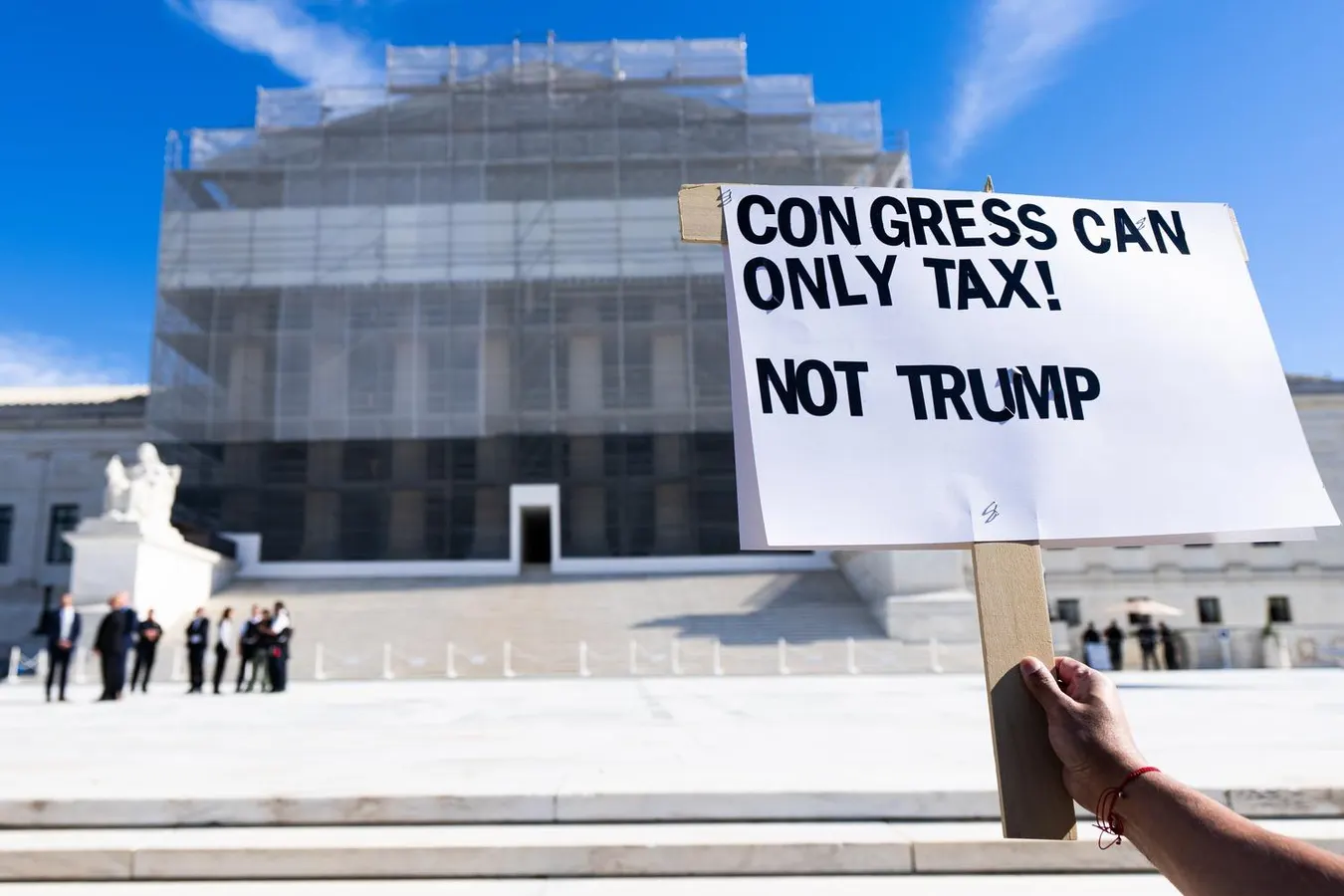Copyright Forbes

History loomed large at the Supreme Court the week of November 3, as the justices heard arguments in a high-stakes challenge to President Trump’s tariff regime. Lawyers for the government and the plaintiffs repeatedly invoked history when trying to defend their positions. And many of their arguments — as well as the justices’ questions — seemed to be drawn directly from a large collection of amicus briefs, more than a few of which were filed by U.S. constitutional and tax history scholars. (Prior coverage: Tax Notes Federal, Nov. 3, 2025, p. 893.) Read as a group, these briefs make a powerful case against Trump’s expansive reading of the International Emergency Economic Powers Act (IEEPA), which the administration has used to justify many of its tariffs. Trump’s interpretation of the act is incompatible with more than two centuries of American governance, the experts insist. More specifically, IEEPA doesn’t allow an end run around the Constitution, the experts contend. First and last, the power to tax — including the power to regulate commerce through tariffs — belongs to Congress. Of course, Congress has delegated some of this authority to the president over the years, beginning in earnest with the Reciprocal Trade Agreement Act of 1934. In subsequent decades, lawmakers passed more laws giving the president authority to adjust tariffs, including (possibly) IEEPA. But lawmakers have been careful to restrict and constrain presidential discretion over tariffs. Indeed, Congress has jealously guarded its tariff authority since the nation’s founding. Trump’s sweeping tariff revisions can’t be reconciled with that long history — or even with the limited, careful delegation of legislative authority that took place in the 1970s. MORE FOR YOU Three important historical arguments against the Trump tariffs emerge from the amicus briefs: Tariffs are fundamentally an exercise of the legislative power to tax, reserved exclusively to Congress since the founding. Even when delegating tariff authority to the president, Congress has made deliberate efforts to limit the executive’s discretion. Trump’s assertion of expansive tariff authority violates the major questions doctrine because Congress never clearly and explicitly delegated that authority to the president. The Power to Tariff The most important historical argument against the Trump tariffs centers on the congressional power to tax. “The power to impose tariffs — like the power to levy taxes — belongs exclusively to Congress. This is no formality,” a brief filed by a group of constitutional scholars says. “The nation was born of the slogan ‘no taxation without representation,’ which means that the authority to tax, raise revenue, and shape the public’s economic obligations is a law-making power, not an executive function. It must rest with the people’s elected representatives.” (Brief of Amici Curiae George F. Allen et al. in Support of the Petitioners in 24-1287 and the Respondents in 25-250, Learning Resources Inc. v. United States, Nos. 24-1287 and 25-250 (U.S. Oct. 17, 2025).) Indeed, the authors of the Constitution were only slightly removed from the great tax and tariff debates of the Revolutionary era. Taxes were a core grievance for the colonists, who objected to levies enacted by a Parliament in which they had no meaningful representation. At the time of the Constitutional Convention, the Boston Tea Party was not the touchstone of American political culture that it has since become. Still, the founders understood that taxes were pivotal to the nation’s formation. Indeed, the Declaration of Independence had made that importance abundantly clear: The imposition of “Taxes on us without our Consent” was one of the document’s key grievances. This recent historical memory shaped the founders’ determination to link revenue powers with democratic representation. When they assigned the taxing power to Congress, moreover, the framers understood that the power applied to tariffs as well as to other kinds of taxes. “Tariffs fall squarely within this constitutional design,” contend the constitutional scholars in their brief. “If the Framers had merely used the term ‘taxes,’ that term would have encompassed tariffs (which are taxes). But the framers went out of their way to list ‘duties’ and ‘imposts’ as within the legislative domain.” And no wonder, the brief says, since the framers expected tariffs to be the principal source of federal revenue. The founders viewed tariffs as foundational but controversial. Import duties raised complex questions and just as reliably triggered bitter conflict among regions and economic sectors. “The Framers’ solution to this problem was to place control over import duties in the hands of a representative Congress, which could appropriately weigh the powerful and divergent interests at stake,” argues a brief filed by several tax law professors, including Conor Clarke of Washington University in St. Louis, Jon Endean of Brooklyn Law School, Ari Glogower of the Northwestern University Pritzker School of Law, and Daniel Hemel of New York University School of Law. (Brief for Tax Law Professors as Amici Curiae in Support of Petitioners in No. 24-1287 and Respondents in No. 25-250, Learning Resources Inc., Nos. 24-1287 and 25-250 (U.S. Oct. 24, 2025).) For nearly 150 years after the founding, Congress exercised (and guarded) its tariff authority. Lawmakers immediately set to work with the Tariff Act of 1789, the second law passed by the new Congress. And they continued to set tariff rates in subsequent years, typically in painstaking and granular detail. “Early Congresses enacted repeated, extensive, and detailed tariff schedules — delegating only limited administrative details to the Executive Branch,” the tax law professors say. “The Executive’s role — which the Executive Branch itself understood — was confined to fact-finding and execution within these congressional boundaries.” Crucially, the founders understood that tariffs were not simply about revenue — they were also an instrument of foreign affairs. But that didn’t change their determination to leave tariffs in the hands of the legislature. “Attaching a ‘foreign affairs’ label to the tariffs at issue here makes no difference,” the tax law professors contend, saying: “Tariffs certainly carry diplomatic consequences. But that is nothing new. The founding generation understood it when they assigned the tariff authority to a representative Congress. The states understood it when they ceded their tariff authority in reliance on that power being wielded by a representative Congress. And the early Congresses understood it when they enacted extensive and detailed tariff legislation shot through with foreign affairs purpose and consequence.” Restricting Presidential Discretion Congress fiercely defended its tariff power for most of the nation’s history. But beginning in the 1930s, lawmakers began to delegate some of this power to the president. Delegation began in earnest in 1934, when lawmakers passed the Reciprocal Trade Agreement Act. That measure allowed presidents to negotiate tariff reductions, but only within limits; the executive couldn’t agree to a reduction of more than 50 percent, for instance. But more sweeping delegations would follow. One of the most important was IEEPA — a measure that allows the president broad authority to regulate trade but makes no specific mention of tariffs. (The Trump administration insists that tariffs are an obvious and legitimate form of regulation.) The congressional delegation of tariff authority has always come with strings attached. IEEPA, in particular, was primarily intended to constrain presidential authority over tariffs, at least according to the amicus briefs. Far from being a green light for presidential tariff-setting, IEEPA was part of the determined effort among lawmakers to reassert congressional control and restrict executive authority over tariffs. IEEPA was a direct (if delayed) reaction to President Richard Nixon’s imposition of a global 10 percent tariff in 1971. Determined to counter the overvaluation of the dollar and alleviate a brewing monetary crisis, Nixon justified his tariff using existing trade laws, including the Tariff Act of 1930 (aka the Smoot-Hawley Tariff Act) and the Trade Expansion Act of 1962. Both measures allowed the president authority to adjust tariffs under certain conditions. After his tariffs had drawn a legal challenge, Nixon also justified his import surcharge using the Trading With the Enemy Act — a World War I-era sanctions statute. Congress responded by enacting a series of reforms, including the Trade Act of 1974 and IEEPA in 1977. The Trade Act granted the president authority to impose tariffs to address balance-of-payments deficits. But it also established clear limits: The tariffs could not exceed 15 percent and could not remain in place for more than 150 days. In other words, Congress was willing to grant the president extraordinary authority over tariffs, but only during a short-term emergency and only with clear guardrails. IEEPA was an effort to limit the permissive delegation of trade authority that seemed to flow from the Trading With the Enemy Act. As a Senate Committee report on the measure explained at the time: “The purpose of the bill is to revise and delimit the President’s authority to regulate international economic transactions during wars or national emergencies.” (S. Rep. No. 95-466 (1977).) In another brief filed with the Court, a group of legal historians emphasized the restrictive intent that lay behind IEEPA and other trade legislation passed during the 1970s. “These reforms were intended to guard against the possibility of Presidents misusing tariff-related powers authorized for emergencies to remake domestic economic policy,” they write. “To read these measures, as conferring unfettered tariff authority on the President is to turn them on their head.” (Brief of Amici Curiae Scholars of the History of Constitutional Law and the Presidency in Support of Petitioners in No. 24-1287 and Respondents in No. 25-250, Learning Resources Inc., Nos. 24-1287 and 25-250 (U.S. Oct. 24, 2025).) A Major Question Finally, several of the amicus briefs argue that the major questions doctrine should apply to the Trump tariffs. “Given the constitutional grounding and direct involvement of Congress in shaping the scope of the President’s authority and discretion over tariffs,” the legal historians write, “the major questions doctrine applies to the President’s claim of unilateral and limitless tariff authority under IEEPA.” The major questions doctrine requires Congress to speak clearly when delegating decisions with profound economic and political significance. Tariffs clearly fit that description. Import duties dominated American politics for much of the nation’s history, even threatening national unity during the Nullification Crisis of 1832. They have also played a key role economically, providing anywhere from 50 to 90 percent of federal revenue for much of the nation’s history. Even today, the money matters: The Congressional Budget Office estimates that Trump’s high-tariff regime is projected to raise around $2.5 trillion over 10 years, making it a very major issue indeed. If Congress had wanted to grant Trump (and other presidents) sweeping authority to levy tariffs, then it should have said so in clear and unmistakable terms. “Here, we have the opposite,” the legal historians write, “a recognition by Congress from the early days of the nation forward that tariffs are a matter of gripping domestic concern and that any authority delegated to the president must be constrained.” A Revolution in Trade Policy Reading the amicus briefs as a group, one clear message emerges: Trump’s tariffs are hard to reconcile with the nation’s history. “Upholding this unprecedented assertion of power would overthrow the congressional tariff system established more than a century ago, enabling any President to recast U.S. trade policy unilaterally, without time limit, without standards, and without congressional consent,” contend the constitutional scholars in a particularly ringing indictment. “To accept such a theory would replace the rule of law with the rule of a man.” Trump’s expansive interpretation of IEEPA is especially problematic. Giving the president unbounded authority to set tariffs runs counter to the nation’s historical commitment to legislative control over taxation. Trump’s assertion of executive authority also violates doctrines designed to preserve the separation of powers and ignores the explicit intent of Congress in the 1970s to restrain, rather than empower, executive action over trade — even in emergencies. Ultimately, the historical briefs reach a compelling conclusion: Upholding Trump’s claim to unbounded tariff authority would constitute a revolution in American governance. Or perhaps more precisely, a reversal of the Revolution that Americans fought two and a half centuries ago. “It would permit taxation by proclamation,” conclude the constitutional scholars, “the very evil the Framers fought to end.”



